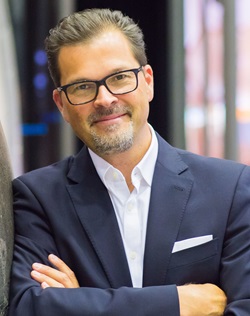Innovation on the shoulders of giants
20 May 2019
Interview with Frank Salzgeber, Head of Technology Transfer and Business Incubation Office, European Space Agency
An artificial heart based on miniaturised satellite technologies. Advanced monitoring of solar plants to maximise efficiency. A lightweight drone with ultra-high resolution remote sensing capabilities. Precision farming. Virtual test-driving for cars. Screening for Alzheimer's. Insulating coating for glass. These are just a handful of hundreds of examples where European space technologies are benefiting our lives on Earth today.
This is the main mission of the European Space Agency’s Technology Transfer programme – to inspire and facilitate the use of space technology for non-space applications. We act like a dating agency for innovation, finding out what companies are lusting after and matching them with technologies from our portfolio.
Sometimes we approach companies directly, because it is easy for people to get stuck in day-to-day business and not look outside the window. But increasingly, Chief Innovation Officers who can’t sleep at night because they are looking for a solution are proactively coming to us to find the answer to their problems. Nevertheless, it can take several years and a lot of persistence to achieve a successful transfer of technology. Some people grumble, usually those who think businesses should continue to be run the old way. But then, whenever you move something on Earth, you get friction.
Technology transfer is not just about licenses and patents, but about connecting experts and sharing know-how. Ultimately, our aim is to strengthen the competitiveness and capabilities of European industry. That is why a big focus right now is on space entrepreneurship. We support good ideas whether they come from – big businesses or tiny start-ups based in someone’s garage. Industry is waking up to the idea that innovation is not always about buying up other businesses or developing things secretly within the company. There is huge value in open collaboration with others. Just like crops need pollination, every company needs to be pollinated by fresh ideas and capabilities from outside.
It is incredible how perceptions of entrepreneurship have changed. When I had my own IT start-up in Munich back in the early 2000s, people said, "Oh, he’s unemployed" – although we were 350 people. Now it’s cool to start a company. This is where the ESA’s 20 Business Incubation Centres, spread over 17 European countries, really come into play. The ESA Business Incubation Centre programme exemplifies the idea that when you stand on the shoulders of giants, you can see farther. The ESA is a giant in the space industry and we currently welcome around 160 new start-ups every year to use our shoulders as a launchpad for their game-changing ideas.
In this sense, we are less like a scary giant and more like a kindly uncle with a bit of cash in our pockets and the right address book. We don’t want anything from the start-ups in return for our support, so we can be neutral and give honest advice. After their two-year incubation phase, as they start to accelerate and internationalise, we continue to help them because we consider them part of the family. Innovation is only innovation when it is successful in the market, and the last mile is the hardest. So we support our start-ups for as long as they need us, like the uncle who helps his niece learn to ride a bike, then stands back as she cycles off alone. Although we do hope she stays cycling around in Europe.
When I say “we”, I don’t mean we achieve everything centrally. Our partners hold over 300 outreach events a year all over Europe, and the 15 “technology brokers” in the ESA Technology Transfer Network have a lot of independence. RINA has been a member of the network since its establishment in 1992 and has helped to support successful transfers of space technologies in areas as diverse as structural health monitoring and big data analysis software. The local knowledge and communication skills of our brokers are essential, because different nationalities – and even different industries – think differently about innovation. This diversity helps to maximise the potential of technology transfer.
From the point of view of standards and certification, perhaps we also need to think differently. Innovators need a playground to try out new ideas and develop them quickly, free from overly burdensome regulations. Sometimes we need to stick a round peg in a square hole to see what happens. What I would really love to see is a standard for implementing innovation, one that allows us to fast-track qualification processes and allows exceptions to 100 percent compliance. Innovation in the rulebooks to fire innovation in real life. That would go a long way towards supporting our goals to successfully transfer space technologies and know-how to Earth and raise the competitiveness of European industry.

Biography
Frank M. Salzgeber is Head of the Technology Transfer and Business Incubation Office at the European Space Agency (ESA). Prior to this, he was Head of Commercial Development in the European Astronaut Department of the ESA's Directorate of Human Spaceflight Microgravity and Exploration. Before joining the ESA, Mr Salzgeber was COO and CFO at an IT start-up that merged with CANCOM in 2003. He also spent seven years at Apple Inc. as an account manager and sales manager. Mr Salzgeber is a member of several advisory boards in the fields of venture capital funds, international cooperation and start-up companies. He is also on the Board of Directors of the European Business Network (EBN) and a board member of the EBAN (European Business Angel Network). He holds a degree in Industrial Engineering and lives with his family in the Netherlands and Bavaria. Genuinely passionate about the importance of human space flight and the European Space Programme, Frank’s believes that "a society that stops exploring stops progressing".